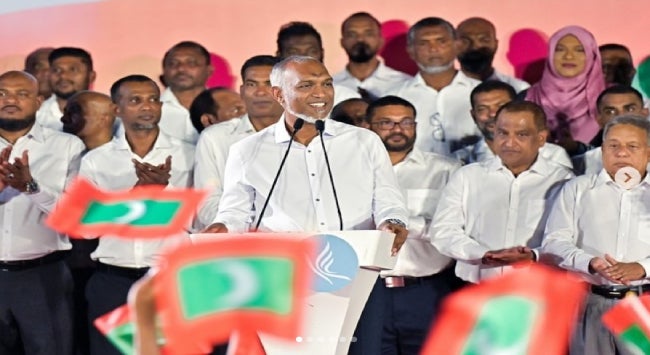Summary
The recent parliamentary election results in the Maldives show that a large number of the voters have unequivocally approved President Mohamed Muizzu’s policies and politics. This has strengthened his political position while weakening the divided opposition.
The results of the 21 April 2024 parliamentary (People’s Majlis) elections have consolidated the position of Maldivian President Mohamed Muizzu, and the ruling Progressive Party of Maldives (PPM) and the People’s National Congress (PNC) coalition. All the candidates of the PPM-PNC coalition contested the elections under the PNC banner. Muizzu contested the polls facing internal factionalism and estrangement from his one-time political mentor and former president, Abdulla Yameen.
A total of 284,663 people were eligible to vote in the parliamentary elections. The voter turnout was 72.9 per cent, the lowest since the political parties were allowed to contest parliamentary elections in 2009. The PNC won 71 out of 93 seats, thereby achieving a ‘supermajority’ (three-fourth majority) in the new parliament. The Maldives Democratic Party, which has 65 members in the outgoing parliament, contested 89 seats but managed to win only 12. Six independent candidates out of 130 contested were also elected. The Democrats and the Adhaalath Party failed to win a single seat. For many, the election results were “unexpected” – only few expected Muizzu’s party to win but such a landslide victory was beyond anyone’s expectation.
During the presidential elections and thereafter, the Maldives’ foreign policy has been the most debated topic in the country and beyond. Muizzu is largely seen as ‘pro-China’ although he calls himself ‘pro-Maldives’ who is committed to following an independent foreign policy. Soon after assuming office, Muizzu visited China in January 2024. During his visit, China and the Maldives signed 20 agreements that included tourism cooperation, disaster risk reduction, a blue economy and strengthening investment in the digital economy. Even while campaigning during the parliamentary elections, Muizzu awarded high-profile infrastructure contracts to Chinese state-owned companies.
In China, the results of the elections were positively received. China’s daily, Global Times, published a piece by Chen Qingqing, saying that the landslide victory to Muizzu’s party “injects more certainty to China-Maldives ties”. In another opinion for Global Times, Su Lun wrote, “…China has never viewed the Maldives parliamentary elections as a geopolitical competition between China and other countries…” After the elections, China’s foreign ministry spokesperson, Wang Webin, stated, “China stands ready to work with the Maldives to carry forward traditional friendship, expand exchanges and cooperation in various fields, deepen China-Maldives comprehensive strategic cooperative partnership and speed up the building of a China-Maldives community with a shared future to deliver greater benefits to our two peoples.”
Muizzu’s victory in the parliamentary elections seem to offer greater leverage to China. However, increasing closeness and greater borrowing from China may create additional problems for the Maldives which is on high risk of “debt-distress”. Notably, China’s current share of the Maldives’ total debt is near about 37 per cent. It is not entirely evident how Muizzu will engage China to address the economic stress of the island state.
India has continued to lend support to the Maldives in spite of recent tensions between the two sides after the Maldivian deputy ministers used derogatory remarks against India’s Prime Minister Narendra Modi in January 2024. On the request from the Maldives in early April 2024, India removed restrictions and allowed the export of 124,218 metric tonnes of rice, 109,162 tonnes of wheat flour, 64,494 tonnes of sugar, 21,513 metric tonnes of potatoes, 35,749 tonnes of onions and 427.5 million eggs to Malé in April 2024.However, a few days later, India imposed port restrictions on the export of essential commodities to the island nation during the fiscal year 2024-25. Goods falling under the prohibited/restricted category will now be permitted for export to the Maldives only through four designated Indian custom stations – Mundra Sea Port, Tuticorin Sea Port, Nhava Sheva Sea Port and Inland Container Depot Tughlakabad. The move is a part of the bilateral trade agreement between the two countries.
Since the comments by the Maldivian deputy ministers, the arrival of Indian tourists to the Maldives sharply declined. The Maldives Association of Travel Agents and Tour Operators has expressed its intention to collaborate closely with the Indian High Commission in the Maldives to attract Indian tourists. The tourism body is planning to launch a comprehensive roadshow across major Indian cities in the coming months.
The supermajority in the parliament means Muizzu has both executive and legislature backing to freely pursue his policies during his tenure. Several political analysts have expressed concern that such a supermajority may result in the return of “tyranny” in the island state. In addition to countering such claims, Muizzu has to deal with factionalism in his coalition and face an estranged Yameen who is now no longer barred from participating in public activities. Muizzu has several serious issues to deal with in the coming months and years.
. . . . .
Dr Amit Ranjan is a Research Fellow at the Institute of South Asian Studies (ISAS), an autonomous research institute at the National University of Singapore (NUS). He can be contacted at isasar@nus.edu.sg. The author bears full responsibility for the facts cited and opinions expressed in this paper.
Pic Credit: Instagram
-
 More From :
More From :
-
 Tags :
Tags :
-
 Download PDF
Download PDF



